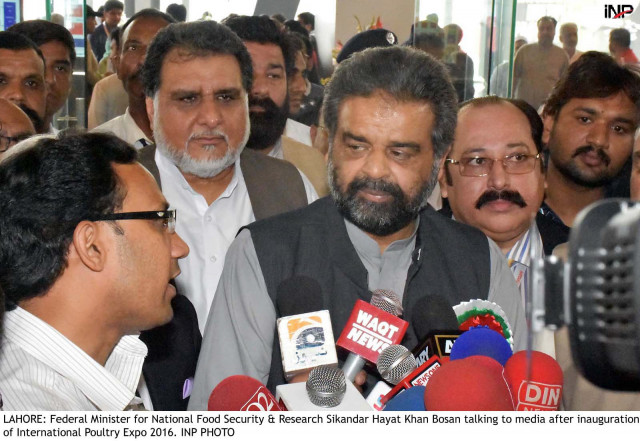With aim of eliminating hunger, govt unveils first food security policy
Targets 4% annual growth in food production, aims to make agriculture climate resilient

Federal Minister for National Food Security and Research Sikandar Hayat Khan Bosan talking to media
PHOTO INP
Minister for National Food Security and Research Sikandar Hayat Khan Bosan launched the policy, which was approved by the federal cabinet a few weeks ago.
Bosan said a long consultative process and delay in formal approval by the cabinet were the reasons why the policy was unveiled so late.
Making an effort: ‘Agriculture sector being upgraded’
The policy envisages 4% annual growth in food production, including crops, livestock and fisheries and will help make the agriculture sector more productive, profitable, competitive and resilient to climate change.
Highlighting the high production of major crops, Bosan said wheat, rice, sugarcane, potato and onions were not only available in abundance in the country, but were also being exported.
“All essential crops and commodities have been in surplus for the past few years,” he said, adding the growth in production would be sustained. The policy document, he hoped, would provide a mechanism to address all four components of food security which included food availability, accessibility, utilisation and stability.
The policy framework is aimed at improving farmers’ access to seeds, fertilisers, pesticides and credit flow, and addressing land and water management issues.
As part of the policy, the National Food Security Council will be established under the chairmanship of prime minister in which all chief ministers and other officials will periodically review the state of food security and take policy measures.
Highlighting the steps taken to reduce the cost of production, especially for small farmers, Bosan said the government had abolished 17% general sales tax (GST) on fertilisers, imposed a uniform 2% tax and reduced duties on pesticides. GST on tractors has been slashed from 17% to 5%. Bosan said the government was also working to produce short-duration seeds to cope with the impact of climate change. He acknowledged the problems being faced by sugarcane growers at the hands of sugar millers as well as the problems arising from the mushrooming of sugar mills in cotton belt. He, however, emphasised both these issues fell within the domain of provincial governments.
PIMS gastro dept flushed with patients
After the I8th Constitution Amendment, provinces enforced the Sugar Control Act and awarded no-objection certificates for setting up sugar mills. He said the Pakistan Central Cotton Committee, which had been under the Ministry of Agriculture, was placed under the Textile Division after the agriculture ministry was devolved to provinces under the 18th Amendment.
The committee had recently been placed back under the food security ministry on hopes that the reshuffle would help revive the committee’s role in cotton production.
National Food Security Secretary Fazal Abbas Maken said procurement of agriculture produce was always a tightrope walk for the government as on the one hand it had to give a good price to the farmers, but on the other it had to keep the price low for consumers.
He said the dilemma could be tackled by increasing productivity so that farmers could benefit even if the produce was not priced high.
Published in The Express Tribune, May 30th, 2018.
Like Business on Facebook, follow @TribuneBiz on Twitter to stay informed and join in the conversation.





1710175205-0/image-(9)1710175205-0-208x130.webp)













COMMENTS
Comments are moderated and generally will be posted if they are on-topic and not abusive.
For more information, please see our Comments FAQ